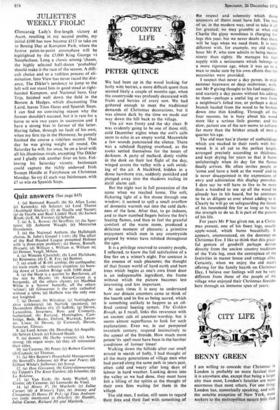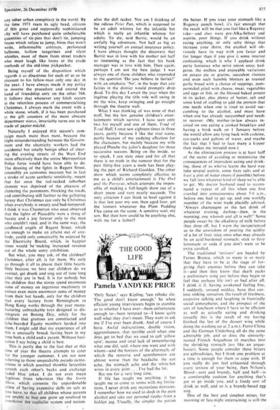BENNY GREEN
I am willing to concede that Christmas in London is probably no more farcical than it is anywhere else, except that being a larger city than most, London's fatuities are more enormous than most others. For one thine. London has, numerically speaking, and with the notable exception of New York, more suckers to the metropolitan square mile than
any other urban conspiracy in the world. By the time 1971 rears its ugly head, citizens of this great and supposedly sophisticated city will have purchased quite unbelievable quantities of tie-pins that don't tie, jumping beans which refuse to jump, biros that won't write, inflammable ashtrays, perforated balloons, hollow tangerines and silent whistles, most of them from street traders who must laugh like loons at the crude methods of the old-time pickpocket.
Being myself of the disposition which regards it as disastrous for each of us to be pleasant to his fellow-man only one day in the year, I have always made it my policy to reverse the procedure and extend the hand of friendship only on the other 364. It follows that whenever any hitch occurs in the relentless process of commercialising Christmas, 1 always mark the event with a white stone, which, if it has been purchased at the gift counters of the more obscure department stores, invariably turns out to be made of papier-mâché.
Naturally I enjoyed this season's cam- paign much more than most, because the slight misunderstanding between the Govern- ment and the electricity workers had the accidental but totally benign effect of clear- ing the evening streets of the West End more effectively than the entire Metropolitan Police force would have been able to do. The dousing of the lights in Regent Street, ostensibly an economic measure but in fact a stroke of acute aesthetic sensitivity, meant that for once the red-necked suburban element was deprived of the pleasure of cluttering the pavements. blocking the roads, and contributing still further to the galloping heresy that Christmas can only be Christmas when everybody is sweaty and bad-tempered. I think it was Chesterton who once observed that the lights of Piccadilly were a thing of beauty and a joy forever only to the man who couldn't read, and in the same way, the cardboard angels of Regent Street, which are enough to make an atheist out of any- body, could only conceivably be enjoyed by the Electricity Board, which. in happier times would be'making increased revenue out of the whole sorry exhibition.
But what, you may ask, of the children? Christmas, after all, is for them. We only go through it all to please their little hearts. Only because we love our children do we overeat, get drunk and sing out of tune long after they are in bed. It is for nobody but the children that the stores spend enormous sums of money on ingenious machinery to extract even more enormous sums of money from their hot hands, only for the children that every factory from Birmingham to Hong Kong works through the year manu- facturing unbreakable toys designed to dis- integrate on Boxing Day, solely for the children that grottoes are constructed and false-bearded Equity members herded into them. I might add that my experience of all this is unusually broad. having been in my time both a child and a parent. Without hesi- tation I say being a child is best.
This is partly due to the fact that at this time of year the theatre attempts to cater for the younger customer. I am not now referring to those unspeakable pseudo-Panto- mimes in which assorted showbiz larcenists scratch each other's backs and exchange faded blue jokes. I do not even mean fugitives from television like the Sooty Show, which commits the unpardonable crime of having expensive dolls on sale as you leave, so that all children whose parents are unable to buy one grow up resolved to overthrow the capitalist system and nation- alise the doll racket. Nor am I thinking of the odious Peter Pan, which is supposed to be an adult whimsy for the infantile but which is really an infantile whimsy for adults. To die, said Barrie, would be an awfully big adventure. Not half as big as writing yourself an annual insurance policy. I have always thought the discovery that Barrie was in love with his mother not half so interesting as the fact that his bank manager was in love with him. Then again, perhaps I am not the best judge. I was always one of those children who responded to the question `Do you believe in fairies?' with an emphatic 'No', in the hope that any fairies in the district would promptly drop dead. To this day I await the year when the ingenue playing the title role will swing in on the wire, keep swinging and go straight through the theatre wall.
What I was thinking of was none of that stuff, but the few genuine children's enter- tainments which survive. I .have seen only two for myself and one of them, Toad of Toad Hall, I once saw eighteen times in three years, partly because I like the trial scene. partly because of my undying affection for the characters, but mainly because my wife played Phoebe the jailor's daughter for three successive seasons. Being on the inside, so to speak, I can state once and for all that there is no truth in the rumour that for the past thirty-five years a mole has been play- ing the part of Richard Goolden. The other show which seems completely effective to me as a child's entertainment is The Owl and the Pussycat, which attempts the impos- sible of making a full-length show out of a short poem and very nearly succeeds. The only criticism I can think to level against it is that last year my son, then aged four, got the horrors whenever the Plum Pudding Flea came on the scene. A sensitive soul, my son. But then how could he be anything else, with me for a father?



















































 Previous page
Previous page